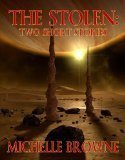Steven Ramirez's Blog: Glass Highway, page 40
July 11, 2013
Secrets of Successful Fiction Revealed via the Movie ‘Notting Hill’
 Send to Kindle
Send to KindleBy Tom Barry
 In addition to enjoying a long and successful career in the corporate world, my guest is also the author of When the Siren Calls, an intense novel of seduction set in Tuscany. Today Tom talks about one of my favorite topics, movies—in particular, romantic comedies. You can learn more about Tom at Tom Barry Writes.
In addition to enjoying a long and successful career in the corporate world, my guest is also the author of When the Siren Calls, an intense novel of seduction set in Tuscany. Today Tom talks about one of my favorite topics, movies—in particular, romantic comedies. You can learn more about Tom at Tom Barry Writes.
The film ‘Notting Hill’ (1999) is one of the most successful rom-coms of the last twenty years. It tells the unlikely story of how a reserved English bookseller William (Hugh Grant) woos and wins the most glamorous and sophisticated movie star of our time, Anna Scott (Julia Roberts). Anyone interested in what makes great commercial fiction (and romantic fiction in particular) need only watch the first five minutes of the film to learn most of the secrets; that’s all it takes screenwriter Richard Curtis to get us hooked.
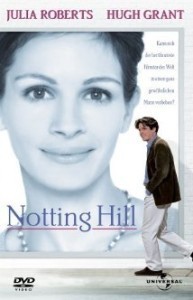
Photo Courtesy of IMDb
In the attention grabbing opening credits we are introduced to both William and Anna, we learn that she is William’s dream woman, and we know from what he tells us in the initial dialogue that the two ever getting together is well nigh impossible:
WILLIAM (V.O.)
Of course, I’ve seen her films and always
thought she was, well, fabulous—but, you
know, a million miles from the world I
live in. Which is here—Notting Hill—not a
bad place to be…
And there we have it; the whole film is set up in the opening seconds by a few visuals of Anna on billboards, of a handsome and likeable youngish man walking through Portobello market, and a single sentence of dialogue. We now can anticipate the rest: the two will meet in what will be a life changing incident, will be instantly attracted, but will then be presented with a succession of ever more difficult obstacles, before love conquers all and the two are united in love to live happily ever after. And that is of course how the story plays out, because the writer knows the formula, he knows what the rom-com market wants, right down to the idyllic happy ending where Anna is rubbing the bulge of her tummy as she lies contentedly on a park bench, with her head nestled in William’s lap. The greatest movie star of all has turned out to be no different from you and me, she’s morphed into the girl next door and we leave our cinema seats a satisfied audience. Ah, if only real life was as good as the movies.
So if it’s that easy, that formulaic, anyone could have written it, right?
Well, some would have us believe so, but they are rarely the ones making millions from movie scripts. (And if ever you do meet this ‘anyone,’ send him or her my way, as I’ve been waiting my whole life to meet them.)
The skill is not in the formula, it is in bringing it to life through compelling action and dialogue. It is in creating fascinating characters who we want to learn more about, and in sweeping us along in a torrent of events. And Richard Curtis does a brilliant job on all counts. No sooner have we met William and been introduced to my favourite character, the flatmate from hell, Spike (Rhys Ifans), than Anna walks into William’s bookshop, by which time we are already sympathetic to William because we have his essential backstory in one memorable line – we know his wife left him for someone who “looked like Harrison Ford, just more handsome.” And we’re still only in the first few minutes.
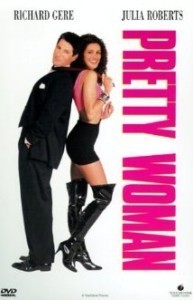
Photo Courtesy of IMDb
But what is perhaps most clever about ‘Notting Hill’ is the reversal of male-female stereotypes in the romance genre. Contrast ‘Notting Hill’ to the stereotypical ‘Pretty Woman,’ also with Julia Roberts, and we see the trick. In ‘Notting Hill’ the wealthy and powerful Richard Gere, is replaced by the struggling and bookish Grant. Similarly the desirable movie goddess Anna Scott replaces the down at heel hooker, Vivian. But in both cases we are primarily rooting for the same person, the protagonist, William in ‘Notting Hill’ and Vivian in ‘Pretty Woman.’ Anna Scott and Richard Gere represent the protagonist’s quest, their goal, the great prize which will make all their endeavours and suffering worthwhile.
Perhaps the only thing that ‘Notting Hill’ really lacks to tick all the boxes is a bad guy, someone who deliberately works against the protagonist’s goal, and upon whom retribution is ultimately served. (In ‘Pretty Woman’ Richard Gere’s slimy attorney played this role.)
Of course, there’s plenty of great fiction, romance genre and otherwise, that does not follow the staple formula. But most of it lies unpublished, let alone make the silver screen. If the objective is to be commercial, to write material that will sell, then it helps if we know ‘the rules’—what the market (readers, agents, publishers, filmmakers) is looking for—then when we break them it is through conscious choice.
If you’d like more insights into writing tips then follow me on twitter @tombarry100 or check out my blog at www.tombarrywrites.com.
Related articles
36 Hours in Notting Hill (ofwise.wordpress.com)
Time for Richard Curtis to get back to rom-com roots (standard.co.uk)
Hugh Grant – The Golden Years (meganlattereviews.wordpress.com)

 Send to KindleLink to this post!
Send to KindleLink to this post!
July 4, 2013
The Gifts We Throw Away
 Send to Kindle
Send to KindlePhoto Courtesy of Elemento Zeca via Creative Commons
I ran across a wonderful article in Brain Pickings about the artist, Chuck Close, who famously said, “Inspiration is for amateurs—the rest of us just show up and get to work.” He also claimed, “I never had painter’s block in my whole life.”
As I write this, I’m thinking of writers who complain about writer’s block the way some people moan about hemorrhoids, but I’m also thinking of those who want to write but haven’t found the inspiration. To the former, you know what you need to do, so stop your kvetching and write. To the latter—those people who know in their hearts they have something to say but are scared to put words to paper— give a listen.
What Writing Is
Like anything worthwhile, writing is work. You sit down either with pen and paper or your laptop and craft sentences, one after the next. You do this every day, trying to hit the quota you’ve established for yourself. If you’re just starting out, I would suggest going for something like two pages a day, or around five hundred words. To do more, you really need to be in shape.
It doesn’t matter what you write about—just write. Having a hard time writing that first sentence? Try this: I was born in [name the year]. Then write about something big that happened that year—maybe something your parents told you about. The World Series is always good. Or maybe the end of the Persian Gulf War. Think about your very first friend. Or someone you kissed once. You get the idea. Soon the words will come pouring out.
If you ever get stuck, just use that exercise. I don’t know why it works, but it does.
What? You’re Still Stuck?
Fine. Try this. Stay up really late and get very, very tired—not drunk! Just tired. Make sure you have a pen and paper. Now sit with your swollen eyelids and cotton mouth, and try as hard as you can to solve a difficult problem. Remember, it has to be difficult. If you’re mathematically inclined, try an algebra problem. Or see if you can figure out how Obamacare is going to work in practice. That should keep you going for a while. The key is to really concentrate.
Pretty soon your mind will start to wander. Strange ideas will present themselves. If you’re lucky, they will be accompanied by bizarre, mind-bending images. Write those down! Never mind that they don’t make sense. These are coming directly from your unconscious and they, my friend, are pure gold.
When you can’t take it anymore, go to bed. In the morning, look at what you wrote down and see if it sparks something—maybe a story? Go write that.
There Is Inspiration
There, I said it. It’s true. Pablo Picasso said, “Inspiration exists, but it has to find you working.” The only question I have for myself is why I continue to quote painters and not writers. I’ll leave that for another post.
So is Chuck Close wrong? Absolutely not. His whole point is to not sit on your keister and wait for inspiration. Start working and the inspiration will come.
As a writer, I am inspired every day. I’m one of those people whose head is constantly filled with ideas. Sorry if that’s not the case for you but there it is. And I’m always writing these things down—titles of future books, characters’ names, snatches of dialogue. I didn’t ask for it—it just happens.
And now I’m speaking again to writers who complain about writer’s block. There are probably ideas coming your way all the time and you’re not taking them seriously. “But my mind’s a blank!” you say. Oh, yeah? Pick up a newspaper for crying out loud. Turn on the news. Life is happening all around you. There must be something you can write about.
I’ll tell you what I think. Somehow Fear, Uncertainty and Doubt have crept into your bed and are terrorizing you with nightmares of failure and bad breath. You have convinced yourself that you will never write again. Maybe it was a bad review online or a disparaging comment at a party. Maybe you just finished reading a great novel and thought to yourself, I’ll never write that well. Whatever it is, just stop it. If you’ve written a book then you’ve already proven you are a writer. Why would that gift be taken away from you suddenly?
Here’s the deal. I’m a writer but I’m also a selfish bastard. Why? Because these are all the things I need to tell myself every day. Part of the writer’s curse, I guess. If they help you, then all the better.
Related articles
Prompts to chase away writer’s block (crissilangwell.com)
Nabokov on Inspiration and the Six Short Stories Everyone Should Read (brainpickings.org)
No Idea (whoamolly.com)

 Send to KindleLink to this post!
Send to KindleLink to this post!
June 27, 2013
Bad Phrases You Should Kill Now
 Send to Kindle
Send to KindlePhoto Courtesy of Catherder via Creative Commons For writers like me, keeping bad, overused or meaningless words out of our work is a constant struggle. For many years I looked to newspapers and magazines as the paragons of good English. Today—and I don’t know if the C students of the world have taken over journalism—I see awful, butchered phrases like preventative measure and at the end of the day gleefully inserted into national, state and local stories.
For writers like me, keeping bad, overused or meaningless words out of our work is a constant struggle. For many years I looked to newspapers and magazines as the paragons of good English. Today—and I don’t know if the C students of the world have taken over journalism—I see awful, butchered phrases like preventative measure and at the end of the day gleefully inserted into national, state and local stories.
In 2008, Oxford University compiled a top-ten list of meaningless, useless phrases (see “‘It’s Not Rocket Science’: The 10 Most Overused & Useless Expressions in English”). So I thought I would list some phrases that often creep into our fiction, phrases you can eliminate today with no guilt whatsoever.
Useless Phrases
These are phrases that add nothing to what you are saying. They neither strengthen your position nor provide insight. They are simply there to take up space. And I love with all due respect because it’s a good indicator that what you are about to say will be mean and insulting.
After all
All in all
And so on
As it were
By the way
For all we know
For the most part
If I were you
If you will
With all due respect
Self-defeating Phrases
These are phrases that weaken or undercut what you are trying to say. And it’s fairly easy to fix these by simply dropping the word fairly.
Fairly certain
Fairly unique
Convoluted Phrases
These are phrases that take the place of simple, meaningful English. I never heard moment in time until John Dean testified at the Senate Watergate hearings in the early seventies. After that, everyone was using it.
At the end of the day
Moment in time
When Can You Use These?
It’s fine to use any of these when your character is saying them. People use tired English all the time. Having your protagonist utter “if you will” at the end of his sentences provides insight into the kind of person he is. You can even use them to comic effect—the pompous ass who prefaces his advice with “If I were you.” Just don’t use them in narration! They will make you look like an amateur.
Which words and phrases bother you? Please feel free to list them below in the comments.
Related articles
Avoiding clichés (blog.oxforddictionaries.com)
Just Sayin’ (thelifeofkylie.com)
Operation 365 Poem: day 147…Phrases (zoeanastassiou.wordpress.com)

 Send to KindleLink to this post!
Send to KindleLink to this post!
June 20, 2013
Let’s Talk Movies!—‘Man of Steel’
 Send to Kindle
Send to Kindle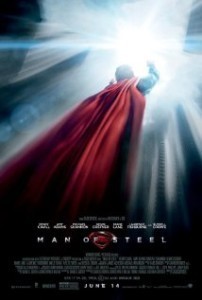
Photo Courtesy of IMDb
‘Man of Steel’ (2013)
Directed by Zack Snyder
Screenplay by David S. Goyer from a story by David S. Goyer and Christopher Nolan
Action/Adventure/Fantasy
Stars Henry Cavill, Amy Adams, Michael Shannon
Warner Bros.
Rated PG-13
Wow, I’m actually writing about a movie that came out in this century. Anyway, I saw ‘Man of Steel’ with my family for Father’s Day. Generally, I enjoyed it until I read this review by Carson Reeves over at ScriptShadow. Yep, pretty harsh. But he does make some excellent points and, with the benefit of time, I have to agree.
The Summary
I really thought this Superman movie was the one. The last Superman (Superman Returns) was so miscast and uninspired, it nearly destroyed the brand. It was that catastrophe that helped Warner Brothers [sic] realize they needed to take Superman in a new darker direction, and I applauded them for that. That’s exactly what Superman needed. It needed filmmakers willing to take risks. Because the idealistic version of Superman is dead. Today, we want our superheroes flawed and a little dark. And that’s exactly what the trailer promised.
Too bad it was only a trailer.
If you watch the trailer you do get a sense that this thing is going to rock. In fact, it’s going to be the best 110 minutes you ever spent. What you end up with, though, is a full bladder and 143 minutes of mostly backstory. Ouch! And don’t get me wrong—I love Russell Crowe. But seriously, they could have made a prequel starring Michael Shannon and him, and called it ‘Krypton.’
The Writing
Man of Steel was not just badly written, it was terribly written. Even more terribly written than Iron Man 3. I mean, at least Iron Man 3 had Robert Downey Jr. to make the dialogue sound kind of good. I do not have enough blog space to note all of the terrible writing mistakes here. And blog space is infinite.
And as Carson points out, some scenes just didn’t make any sense. Here’s Clark Kent as a kid, confused and frightened by his X-ray vision and super-sharp hearing. So he tears out of the classroom and hides in a storage closet. Now the teacher shows up—as well as the entire class! What is this, a field trip?
Here’s another one. The guy flies around at like a million miles an hour, right? But no matter where he goes, Lois Lane is there. What, did she commandeer the transporter from ‘Star Trek’?
And how about this? There’s a moment toward the end when General Zod makes a big speech intended to evoke sympathy, I guess, which explains in plain English what drives his behavior. Excuse me but we got that in the first few minutes of the movie. He’s devoted to Krypton and will do anything to protect its future. Check! Do we really need the stupid on-the-nose speech?
And while we’re at it, why is Superman so frickin’ moody all the time? Honestly this thing was just begging for a Lex Luthor as portrayed by Danny DeVito. Or Joe Pesci. Oh and don’t let me forget. Superman can’t breathe on General Zod’s spaceship—he even gets a nosebleed. But he has no problem in space.
I do take exception to one thing Carson wrote. Here’s what he says about the tornado sequence where Clark Kent’s dad dies:
Again, I understand that this is an exploration of Clark’s inner conflict going on here – whether he should show his powers or not (and all the Jesus themes that come with that). But do you have to use a dad dramatically waving his son off from a LEVEL 5 TORNADO to get that conflict across??? What are the chances of ONE MAN finding a crashed alien and being killed by a tornado in the same lifetime???? A quadrillion to 1?
Now, I loved that scene and frankly I thought it was the best moment in the movie. It’s New Testament stuff. The father, who’s been a pillar of strength and wisdom for all of Clark’s thirty-three years, demonstrates one last time what it means to protect someone you love—even if it means you dying in the process. A beautiful, poetic moment that Kevin Costner played perfectly. Sorry, Carson, it worked for me.
Vfx Gone Wild
Okay, so I didn’t see this movie in 3D. We would’ve had to wait another hour-and-a-half. Best decision I ever made by the way. After that third act, I was exhausted! These guys don’t know the meaning of excess. I mean, how many times do I need to see cars flying and spinning. And how about Superman and General Zod hurtling through buildings—through walls and windows—until the buildings are literally cut in two? It was fun the first time—not the fifteenth.
And here’s something I really didn’t get. Superman, General Zod and his minions are stronger on earth because of differences in gravity or whatever. But with the beating they’re taking, how come their costumes don’t fall apart? Who made these things, Edna Mode? I mean, if I had just flown two hundred miles an hour through several steel, concrete and glass buildings, wouldn’t my cape at least get a snag?
Final Word
Superman is boring, no question. And Clark Kent, the reporter, doesn’t come into the picture until the epilogue. Maybe he’ll be clumsy and charming like Christopher Reeve in the next one. Or maybe we’ll just get more spinning cars and people breathing in space without oxygen.
Carson concludes that the movie is trash. I disagree. I’d give it a C+. Go see it. For the most part it’s fun—you’ll enjoy yourself. Just be aware that this is not A-List writing. Oh and if you suffer from motion sickness, bring a barf bag. Or close your eyes for the last thirty minutes. It’s like being inside the Zipper with the Joker at the controls.
Of course, you could just watch this featurette and call it a day.
Related articles
Six lessons from ‘Man of Steel’s’ success (latimes.com)
Movie Review: Man of Steel – New Suit, More Action and General Zod! (blazingminds.co.uk)
‘Man of Steel’s’ Christian link (latimes.com)

 Send to KindleLink to this post!
Send to KindleLink to this post!
June 13, 2013
When Your Mojo Isn’t Rising
 Today I am happy to feature a delightful guest post by a lovely and charming editor and writer from the UK, Vickie Johnstone, author of The Sea Inside. Like many writers, Vickie sometimes wrestles with writer’s block. The good news—she has a cure! You can read her blog at Vixie’s Stories.
Today I am happy to feature a delightful guest post by a lovely and charming editor and writer from the UK, Vickie Johnstone, author of The Sea Inside. Like many writers, Vickie sometimes wrestles with writer’s block. The good news—she has a cure! You can read her blog at Vixie’s Stories.
At the beginning of this year, I found myself unable to write. I had been writing almost continuously since 2011, when I discovered self-publishing and inspiring writers’ groups online. It was a miracle for me, Miss Lazy, I can tell you. But from the first week of December until about March, I just couldn’t write. I came up with a plan, which you might find helpful… or not  I can honestly say it worked for me and I managed to finish the fantasy book I started in 2009 (yes, I’m the big procrastinator), called The Sea Inside.
I can honestly say it worked for me and I managed to finish the fantasy book I started in 2009 (yes, I’m the big procrastinator), called The Sea Inside.
Here are my ideas to get your creative mojo rising –
1. Write something every day – for me I started by writing a poem every day on my blog.
I find that writing poetry easier in that mine are bits of flash, written fast. Sometimes they’re okay, sometimes they’re a bit crap, but it’s me getting words down on paper and I love it. A good brain shake.
2. Focus on one story – unless you get stuck.
I realised that part of my problem was that I couldn’t choose what to write. In my head I had been switching between ideas for various books. I never outline stories and just create them in my head, where they float around until I write them down. But all the stories were becoming muddled. Unable to focus, I forced myself to write some notes on each idea in a notebook, so I didn’t forget them. Then I focused on one at a time. But if you get stuck on one project, don’t linger – switch!
3. Read! Read! And read!
I haven’t been reading much lately, so my aim is to read more books! I used to find that the more I read, the more I wanted to write. Most of my reading was done while commuting to work on the train, but since working from home, I’ve lost that time. I realise I need to work this into my day in the same way as I used to when I was working in an office.
4. The notebook.
I’m going to try to write something new in my notebook every day. And I promise to take it everywhere, except the shower. But, doh, I get poems in the shower… splash.
5. Structure your day.
I realise I need to divide up my day a bit better. Since working from home, I lack the structure of a normal working day. I feel bad if I am not marketing my books, so instead of panicking and spending too much time on social networks, I’m going to divide up my day, so I have a certain amount of time spent marketing, socialising, tweeting, helping others and writing. I realised I’ve also got behind on posting things on my blog, such as interviews with other authors, so that will come under this list.
6. Enter competitions.
I’m going to do this because it will make me feel better about my writing. It will make me feel like I’m doing something proactive to get my books ‘out there’, even if they’re not selling. I entered the Indie Excellence Awards 2013, and to my astonishment, Kiwi and the Serpent of the Isle (book four in the Kiwi Series) was a finalist. This just goes to show that it’s worth trying – you never know. I was so shocked that I felt sick, but then I was doing some leaps.
7. Wake up and stay fresh.
Spend less time snoozing and get up earlier. I find that yoga in the morning gets my brain working and I feel more energetic, so that’s going into my writing mission. Plus porridge, the magic mood food, which seems to give me energy.
8. Get out and be inspired.
Head outside and look at new things. I tend to hole myself up with my laptop for much of the time, but it’s probably not healthy. If you work from home, it’s easy to become a bit of a hermit. Not that I’m feeling crabby, but you know… Looking at new things and seeing people is inspiring, and good for your mood. Seeing new things gets your imagination working. All of these things freshen us up and make us want to be creative.
9. Get creative = think creatively.
Do other creative things when you’re not writing – dancing, yoga, painting or drawing, and taking photos. Or just daydreaming! Whatever floats your boat.
10. Don’t panic and think NaNo.
Not panic that the block may set in again, but just go with the flow. NaNoWriMo showed me that you can write 50,000 words in a month if you really try.
11. Make time for yourself.
Make sure you still have time for yourself and your hobbies, friends, etc, besides working.
So, that’s my mission for 2013.
For you guys, well, let me just say… get writing everyone. Just write about anything. If not, get out and look at things. Have fun, see people, watch a film, look at a painting or go for a wander in the woods… the simplest things get our imaginations flowing… yay! I hope! 
To finish off, here are some quotes from famous writers on The Block…
“Writing about a writer’s block is better than not writing at all.” Charles Bukowski
“There’s no such thing as writer’s block. That was invented by people in California who couldn’t write.” Terry Pratchett
“I learned to produce whether I wanted to or not. Chain that muse to your desk and get the job done.” Barbara Kingsolver
“Everything in life is writable about if you have the outgoing guts to do it, and the imagination to improvise. The worst enemy to creativity is self-doubt.” Sylvia Plath
“Easy reading is damn hard writing.” Nathaniel Hawthorne
“The art of writing is the art of applying the seat of the pants to the seat of the chair.” Mary Heaton Vorse
“I only write when I am inspired. Fortunately I am inspired at 9 o’clock every morning.” William Faulkner
“What I try to do is write. I may write for two weeks ‘the cat sat on the mat, that is that, not a rat’. And it might be just the most boring and awful stuff. But I try. When I’m writing, I write. And then it’s as if the muse is convinced that I’m serious and says, ‘Okay, okay, I’ll come’.” Maya Angelou
“The best way is always to stop when you are going good and when you know what will happen next. If you do that every day you will never be stuck. Always stop while you are going good and don’t think about it or worry about it until you start to write the next day. That way your subconscious will work on it all the time. But if you think about it consciously or worry about it, you will kill it and your brain will be tired before you start.” Ernest Hemingway
And my favourite, from Steve Martin…
“Writer’s block is a fancy term made up by whiners so they can have an excuse to drink alcohol. The other trick I use when I have a momentary stoppage is virtually foolproof, and I’m happy to pass it along. Go to an already published novel and find a sentence that you absolutely adore. Copy it down in your manuscript. Usually, that sentence will lead you to another sentence, and pretty soon your own ideas will start to flow. If they don’t, copy down the next sentence in the novel. You can safely use up to three sentences of someone else’s work – unless you’re friends, then two. The odds of being found out are very slim, and even if you are there’s usually no jail time.”
When Your Mojo Isn’t Rising" onclick="javascript:this.select()" readonly="readonly" style="width: 100%;" />
June 6, 2013
Let’s Talk Movies!—‘The Frighteners’
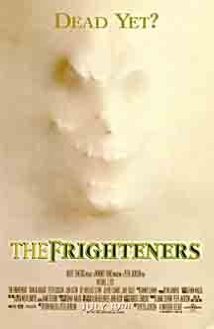
Photo Courtesy of IMDb
‘The Frighteners’ (1996)
Directed by Peter Jackson
Screenplay by Fran Walsh and Peter Jackson
Comedy/Fantasy/Horror
Stars Michael J. Fox, Trini Alvarado, Peter Dobson
Universal
Rated R
I got a chance to watch this cult movie (which means it didn’t make any money) again after having only seen it once when it first came out, what, almost twenty years ago? And I’m here to tell you that I enjoyed it even more this time.
There’s a lot of wicked humor—not the least of which is provided by the talented John Astin as The Judge. What a hoot! And then there’s the inimitable Jeffrey Combs as FBI special agent Milton Dammers. This guy looks like Adolph Hitler minus the moustache and with the edgy charm of Norman Bates on crack. I guess he felt he had set the bar in ‘Re-Animator’ and was obligated to outdo himself.
The Kitchen Sink
Never mind about the plot—this isn’t a movie review. Let me point out, though, that this thing has just about everything in it—including a serial killer, a haunted house and time travel. I’m not sure what New Zealanders dream of at night but some of their movies are pretty out there. To that point, Peter Jackson had previously co-written and directed the outrageous ‘Dead Alive’ (1992). So I guess Universal decided to give him a shot at a “mainstream” movie for them.
And ‘The Frighteners’ isn’t exactly mainstream. First off, it was shot in New Zealand using mostly American actors. Because of that it has a bit of a dreamy, unfamiliar quality to it. Interesting factoid: according to a Wikipedia article, the movie was originally supposed to be directed by Robert Zemeckis, who exec produced. After seeing the wicked ‘Death Becomes Her’ (1992), I think that wouldn’t have been a bad idea.
The only thing I have against this movie is the vfx, which were probably state-of-the-art at the time but whose quality, like that in ‘Ghostbusters,’ looks cheesy by today’s standards. Which leads me to my next point.
Remake Time!
There aren’t a lot of movies that should be remade IMO but this one could work. And, let’s face it, you’ve got to get Woody Harrelson in there somewhere. CGI is so good now—not to mention IMAX—this thing is begging to be remade.
What do you think? Should we start a campaign and bombard Universal with email? Let me know.
Related articles
Bad Taste 1987 – What did Peter Jackson direct before visiting Middle-earth (meangoblin.com)
First look: Evangeline Lilly’s elf warrior in ‘The Hobbit: The Desolation of Smaug’ – EXCLUSIVE (insidemovies.ew.com)
Animation Alumnus Greg Towner Reflects on His Work on (academyart.edu)

Link to this post!

May 30, 2013
Tell Me When I’m Dead—Cover Reveal!
This is it—the cover for my new zombie novel, Tell Me When I’m Dead! I’m really excited about it too because the eBook cover coming together like this was pure serendipity.
In the book, a twentysomething guy named Dave Pulaski from a small town called Tres Marias finds himself up to his waist in zombies. Though there are plenty of guns, his weapon of choice is an axe. (You can read the synopsis in a previous post.)
It’s not easy creating a book cover! I tried like hell to find an image that would capture the spirit of the book—especially the axe. I settled on a photo my cover designer, Deborah Sletten, found and we went with that. But I was never really in love with it. Deborah did a fantastic job, as always, but there was no axe. And when she added one, it just didn’t do it for me.
Now I am not an artist but I know what I like. (This is the worst kind of client, by the way). So I took a step back and started looking for a new image. Then I found this—a work by Kevin Asmus. Of course, this thing just came out of his head for who knows what reason. Nothing to do with my story. But I thought it worked perfectly. Thankfully Kevin agreed to license it and Deborah got to work. Whew!
Why am I giving you all this behind-the-scenes nonsense? Because as an indie author I like transparency. I feel it helps others to understand that there’s really no secret to publishing a book. It’s just good old-fashioned hard work. Well, that and a little serendipity.
Let me know your thoughts in the comment section.
Link to this post!

May 23, 2013
Critical Thoughts on the Sci Fi Genre
 Okay, this is way cool! Today I am thrilled to offer a guest post by Michelle Browne aka “SciFiMagpie” and author of
The Loved, The Lost, The Dreaming
—among other books. Today Michelle talks about her passion for science fiction and how she believes it needs to get better.
Okay, this is way cool! Today I am thrilled to offer a guest post by Michelle Browne aka “SciFiMagpie” and author of
The Loved, The Lost, The Dreaming
—among other books. Today Michelle talks about her passion for science fiction and how she believes it needs to get better.
I know I’ve been laying on the somewhat negative and critical posts lately, and yes, this is going to be another. There’s a good reason for this: I love science fiction. Deeply. It’s been an adventure and an escape, a set of connected worlds I can play with. I love urban fantasy just as much. These are my worlds; and you, reader, if you enjoy these genres, you are one of ‘my people.’ There is darkness here, and struggle, and there are wondrous things.
However, I love these things too much not to examine them honestly. Much as a good relationship means improving yourself and helping your partner continue to be a better person, genres necessarily need to be criticized in order to keep developing. When they stagnate, they die. When they change…we find new and amazing things.
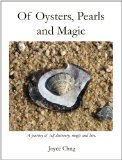

This is a marvellous example of feminist sci fi with a damn cool setting, dreamy prose, great characters, and non-traditional partnerships. It even inspired some of my own work.
I’ve praised ‘my’ field before for its generally progressive approach and open-mindedness. Sci fi is where you go to read about transhumanism, inter-species tolerance and multiculturalism, environmentally conscious dystopias, and a plethora of political approaches to interplanetary government and domination. If you can think of an idea, it’s been done in sci fi: liberal and conservative ideas alike are featured here, sometimes mixed together. Science fiction is driven by fantastic elements and factual ones, and it’s a big, broad, wonderful genre to play in.
However, it also has its downsides. A lot of sci fi tends to be geared towards white and western people, and particularly men—however, female cast members and minorities are generally visible, at least; a lot of sci fi is set in a post-national world. Think of ‘Star Trek,’ which was definitely trail blazing in this area. Diversity is a given. Women shoulder guns and lead commands alongside their male comrades and no-one gives it a second thought. Representation of LGBTQ people could use some work, but for a starting point in a genre, I’d still argue that sci fi is mostly ahead of the game.


This is on my ‘TBR’ (To Be Read) list.
So where’s the problem?
What I want to know is, why is a genre that’s known for forward-thinking attitudes and powerful, strong female characters so reluctant to let the romantic side of things out? Sure, I can think of several television shows offhand that featured strong romantic plots—my favorites being ‘Farscape,’ ‘Futurama,’ and ‘Doctor Who’—but writing about love is another matter. Search for ‘sci fi romance’ and you’ll have a tough time scraping up listings. It’s ‘not cool’ and ‘not allowed’ for men to indulge in their romantic sides, and I don’t really need to reiterate the complaints of female authors who fail to get recognition from publishers and advertisers. Anything that’s just a bit too far off mainstream appeal doesn’t really get the press, and readers who really might enjoy hearing about it often miss out as a result.


This one is one of the only true science fiction romances I’ve ever heard of.
Why do you care? You’re not exactly a squishy romance type.
Well, it’s true, I’m not. BUT—that doesn’t mean that it shouldn’t exist, or that romance and intellect necessarily have to be polar opposites. There is a lot of room for a human interest story that explores cultural clashing or transhumanism or a myriad of wonderful topics. However, the lack of romance suggests that the field’s traditional distrust of women and quiet rejection of us hasn’t been ameliorated yet. The way publishers and marketers are uncomfortable with ‘ethnic’ books or ‘queer’ books speaks for itself, too: sci fi can push boundaries, but only so far as society’s comfortable in handling those pushes.
That deserves to be fixed. Women (a majority of the population, I might add) have a lot to contribute to sci fi; not to mention the amazingly different and wonderful perspectives that genderqueer people also bring. The field is already tantalizingly open to non-mainstream groups, but when it comes to advertising their publications, minority groups just fall off the map. A quick glance through bestselling names on Amazon’s sci fi list reveals page after page of decidedly Anglo-Saxon and masculine names. However, what if things go the other way? What if it’s completely (or at least balanced) with a lot more minority voices and female perspectives?
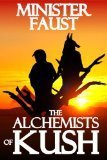

I absolutely love this author’s style. It completely stunned me: I had no idea Afrocentric stories were a thing, and in spite of lacking the cultural perspective and ‘ins’—I love them!
Is there an ‘overload’ point for feminism and other types of activism?
To put it bluntly: no, but yes. It’s quite possible to go overboard in the correction zone and make an exaggerated attempt to balance everything that compromises the quality of the book. The message and characters may be good, but overemphasis and lack of humour can really kill the efficacy. It’s a bit like some of the posts I’ve seen on Tumblr about the subject of activism: minority complains about mainstream, sometimes makes jokes about death and murder of mainstream, complains more and is unfriendly, and then wonders why mainstream is not listening to them. Since I do belong to a couple of minority groups and I interface with a lot more, but also belong to several mainstream categories, I’ve seen both sides of this divide and it’s rarely pretty. So, I’ll grant that a story with the wrong tone could be incredibly grating to read.
However, the number of cases where overcorrection has been a problem that I’ve seen so far has been exactly one. That’s right, one; and the only interesting part of the moody, pretentious book was the alt-sexuality angle—which, by the way, was basically irrelevant to the pseudointellectual plot. Fortunately for you, dear readers, I can’t remember the title of the damned thing, and I’m quite positive it was donated to a second-hand bookstore some years ago. (Hilariously, I recall the author being white and male. It’s not always the activists you’d expect…
Individual writers sometimes comment obnoxiously, but I’ve never seen a story really suffer for a lack of white people or hetero sorts or other societally conventional types. Ever. For one thing, they’re so incredibly rare that the market is far from flooded, and for another, there are so many ‘traditional’ stories already weighing that scale down, I can’t see oversupply ever being an issue. Being someone who tends to write on the light end of that scale, of course, I’m obviously a bit coloured in perspective. Point is, we would need many years’ worth of writing to compensate for even half of a quarter of the mainstream hero stories.


This one was a recommendation from a friend.
FIX IT FIX IT FIX IT FIX IT
The fix for this is simple: stop reading my post and go read some books by ‘non mainstream’ authors. Expand your boundaries a bit and edge outside your comfort zone. That’s all it will take to change things. I’m not saying that we need to burn every book by a white, straight male: I have a whole bunch of books that are dearly beloved and fall into the ‘mainstream author’ category. All that really needs to happen is a little more openness and some experimentation.
This is sci fi. This is a speculation on our future. Let’s make it inclusive, multicultural, and vibrant: it can only make the world more awesome.
And, I’d be a bit of an arse if I didn’t include a link to my own attempts to write ‘better’ science fiction.
Thanks for dropping by the nest once again. Don’t miss any of the phuquerie. Find me on Twitter, Facebook, and on Tumblr. More interviews and witty commentaries are coming. Keep checking back to see those surprise posts, too. This is your darling SciFiMagpie, over and out!
Related articles
From SciFi to SciFact – The Starship Enterprise (astronaut.com)
The 50 Best Sci-Fi Movies (complex.com)
Sci-Fi Classic: Rendezvous with Rama by Arthur C. Clarke (readmorebooks.wordpress.com)

Link to this post!

May 16, 2013
Zombies—That Thing You Do
Photo courtesy of Blastr There’s a discussion going on in the one of the Goodreads groups I follow about zombies and why we are obsessed with them. I know there’s been a ton written about the subject but, since I’m publishing Tell Me When I’m Dead this summer, I thought I would weigh in.
There’s a discussion going on in the one of the Goodreads groups I follow about zombies and why we are obsessed with them. I know there’s been a ton written about the subject but, since I’m publishing Tell Me When I’m Dead this summer, I thought I would weigh in.
Zombies Are Cool Again
I’m not sure they ever really went out of style but zombies appear to be cool again. A few years ago we were treated to the excellent ‘Zombieland,’ followed by this year’s ‘Warm Bodies.’ Now Brad Pitt thinks enough of the little buggers to star in a new zombie movie, ‘World War Z,’ based on the book by Max Brooks. Of course, he also played a vampire opposite Tom Cruise a million years ago. Who knows, maybe werewolves are next.
Zombies Are Fun to Kill
Mainly because there’s no guilt. Their destruction also allows for some creativity based on the circumstances and the weapons available. Take a look at this compilation video of kills from ‘The Walking Dead.’ Tip of the iceberg, my friend. And for more fun, check out the old ‘Resident Evil’ movies.
A note here. When incorporating zombies into a novel, you really have to work hard to make each kill unique otherwise the reader will get bored. Most of the time you must rely on guns. In my story, Dave’s favorite weapon is an axe and he does a lot of damage.
Zombies Are Hard to Kill
This is especially true if a loved one has become a zombie. There’s a beautiful moment in Season One of ‘The Walking Dead’ when Morgan is unable to kill his walker wife. For the longest time he watches her through the scope of a high power rifle but cannot bring himself to pull the trigger.
A similar moment happens in another episode with Andrea when her younger sister is savaged. She remains with her sister all night, holding her and talking to her. Unlike Morgan, though, she dispatches the girl once she turns. But it’s not easy.
Fast vs. Slow
In the classic ‘Night of the Living Dead,’ the ghouls are slow. If you ran even a little track in high school, you should be able to easily outrun these losers and live another day. What they lack in speed, though, they make up in numbers. And remember, when this iconic movie came out, the idea of your dead neighbors feasting on people was still fairly fresh.
Things changed a lot with ‘28 Days Later.’ These miscreants are not only vicious but they move really fast. Why? Because technically they’re not really zombies. They are in fact still very much alive. But they carry a rage virus that turns them into monsters who will mess you up.
Still. For me they fall into the zombie category, much like the vampires in ‘I Am Legend.’ And unlike Edward, there is zero romance to those things!
Zombies Have No Agenda
Well, other than to eat you. They don’t make value judgments and they don’t care what you look like. They are not inherently evil—they just are. Like scorpions or black mambas. Frankly, that’s the difference between zombies and vampires. Vampires know exactly what they are doing and revel in it. After all, they’ve been doing it for centuries. Zombies are for the most part mindless and cannot help what they do.
Zombies Inspire Sympathy
Because they are victims. Something was done to them and now they are condemned to walk the earth in perpetual darkness. They don’t appear to experience pleasure and they have no purpose. This is the flip side of the fate that was meted out to Prometheus. He was condemned to endure the punishment of an eagle tearing out his liver every day for eternity. If it hadn’t been for Hercules, he’d still be tied to that rock.
Zombies Are a Blank Slate
You can put whatever “message” you want on them. End of Days, science gone wild, plagues from outer space. Whatever. They are malleable and work well in stories. There are hundreds of books and movies about them—all unique.
From a Christian perspective, they are the opposite of what is supposed to happen at the end of the world. At that time, according to the bible, everyone will rise from the dead. And it’s not a bad thing if you’ve lived a good life.
Zombies are a cruel perversion of this story of hope. Maybe that’s why we loathe them so much.
It’s Not About the Zombies
If you write a story featuring zombies, it’s never really about zombies. You could just as well have written about the Black Death, Martians or giant ants. You are using them as background. Well, other than ‘Warm Bodies.’ But even that wasn’t about zombies—it was about people who are dead inside—lacking love and purpose. Consider the movie’s tag line: He’s still dead but he’s getting warmer. Thank you, studio marketing department!
If you think about it, at least in movies, zombies are simply the monsters that drive the story forward. They represent what everyone is trying to get away from—or what they are trying to cure as in the Will Smith film I mentioned. ‘I Am Legend’ is one of the several movies based on the excellent 1950s novel by Richard Matheson. Interestingly, in that story the monsters are actually vampires. No matter. Robert Neville is faced with the same challenges. He must kill as many of the infected things as he can during the day and try to make it through another night alone without getting bitten.
Tell Me When I’m Dead
So what about my story? Well, I am a huge fan of zombies—I just like them, okay? And I thought they would make a great backdrop to the story I wanted to write about Dave Pulaski, a young guy who has screwed up a lot in his life but gets a chance at a happy future until his wife finds out he cheated on her. If that isn’t enough, now these pesky dead people start showing up.
My story is about redemption and forgiveness. The zombies are there for the fun.
As a writer, I am always trying to tell a great story. It will be up to readers to let me know whether I succeeded.
Meanwhile let’s see how Brad is doing.
Related articles
The guy who gave us zombies (books.blogs.starnewsonline.com)
World War Z: Screw The Movie Edition (wilsonkhoo.wordpress.com)
‘The Walking Dead’ Movie: “[It's] Gonna Be In the Works Not Too Far Down The Road” (thedeadwalkers1.wordpress.com)

Link to this post!

May 9, 2013
Screenwriting Advice from Phantom Bigfoot
 Here is a guest post by fantasy author Simon Okill, who wrote Nobody Loves a Bigfoot Like a Bigfoot Babe. Catchy, right? Simon is Welsh, charming and funny—in that order. For those of you who are just starting out in screenwriting, these writing tips will prove invaluable.
Here is a guest post by fantasy author Simon Okill, who wrote Nobody Loves a Bigfoot Like a Bigfoot Babe. Catchy, right? Simon is Welsh, charming and funny—in that order. For those of you who are just starting out in screenwriting, these writing tips will prove invaluable.
First, for everyone thinking of writing screenplays—READ THIS BOOK—Script Writing Cheat Guide by Stuart St Paul. You will thank me.
This book strips screenplays to bare bones and is utterly ruthless, so be prepared for a bruised ego. The guide tells the reader how to get their screenplay into the hands of a willing film producer. A producer rarely reads the script first, they leave that to their readers—Layout—Marketability—Overall Story. Your script has to pass all three stages before a producer reads it. After all, time is money and wasted time cannot be retrieved.
So here are some tips—Final Draft format, font 12 TNR of Courier, 90-120 pages, absolutely no double spacing between words, scenes, etc.
Few capitals, as sounds are no longer uppercased. When a character moves from room to room, start with a new INT scene header. In EACH SCENE, each character must be introduced in upper case and there on lower case. A character must never be introduced with dialogue, EVER.
Give them something to do first and keep to a minimum their description. The plot must be set up in the 1st ten pages and the hero must be obvious. The hero must have conflict and a ticking clock—a set amount of time to solve their problems—obvious example, ‘High Noon.’
Try passing the ball—the audience will soon get bored watching the hero, so just as they are looking dead in the water, cut away and show the subplot, leaving the audience gasping to know what has happened to our hero.
Make sure there three clear turning points—first about 6 to 10 pages in, the big one half way then the final one leaving ten pages to the finale.
Never go into detail about how the character reacts, what they’re wearing or cute camera shots, i.e., extreme close up. Give information only once.
Hints—After your screenplay is done, cut the first 20 pages off and see if the story can be followed. If it can, drop those pages. Start scenes as late as possible and finish them quickly.
That’s it. There’s a lot more in Stuart St Paul’s brilliant book.
Nobody Loves a Bigfoot Like a Bigfoot Babe
The Northern California town of Big Beaver has become a haven for Bigfoot, alien sightings and is home to The Phantom Bigfoot Bather. One particularly weird Beaverite, Duane, has kept the Bigfoot a secret, but to his utter dismay, a female Bigfoot abducts a teenager. Duane must use all his guile to stop his secret from getting out, especially now that MB, his close friend and crypto-zoologist, is on the trail, along with Sheriff Lou and the FBI. Can Duane keep his Bigfoot friends a secret? And what does MB discover deep in the forest?
Related articles
Author Interview – Simon Okill AKA Phantom Bigfoot (dlhbookreviews.wordpress.com)
Screenwriting Tips (burjintheburbs.wordpress.com)
Bigfoot: Truth or Myth (VIDEO) (indianasnewscenter.com)

Link to this post!

Glass Highway
- Steven Ramirez's profile
- 176 followers




